 |
|
Online NewsHour Special Reports:
2000 Democratic Convention
Election 2000
Aug. 16, 2000:
Delegates from George
W. Bush's home state find a role at the convention.
Aug. 16, 2000:
Colleagues of the vice
presidential candidate discuss his background.
Aug. 15, 2000:
Who
are the Democrats of 2000?
Aug. 15, 2000:
Hollywood
and Senator Joe Lieberman faceoff.
Aug. 15, 2000:
Former
Vice President Walter Mondale talks about the race.
Aug. 14, 2000:
Former
President Jimmy Carter discusses Gore and the Democrats.
Aug. 14, 2000:
Former presidential candidate Bill
Bradley on the campaign.
Aug. 14, 2000:
Delegates from Arkansas
look at Clinton's
legacy.
Aug. 11, 2000:
Sen.
Joe Lieberman talks about his candidacy, religion and the
campaign.
Aug. 11, 2000:
Shields
and Gigot discuss Gore/Lieberman.
Aug. 11, 2000:
Examining Gore's
economic plan
Aug. 10, 2000:
Los
Angeles prepares for the Democratic Convention.
Aug. 8, 2000:
An
historic choice.
Aug. 7, 2000:
Al
Gore asks Lieberman to be his running mate.
Browse the NewsHour's
coverage of Politics
and Campaigns and Election
2000
|

|

|
 |
|
|
|
JIM LEHRER: Quickly now to our historians for a comparison.
Haynes, beginning with you, what do you think? How would you compare
these two conventions?
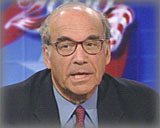 HAYNES
JOHNSON: They were totally, completely different obviously from the
very beginning. In Philadelphia, you had this absolutely tight control.
George Bush himself said he had an iron fist and they got exactly what
they wanted out of that convention, total unity. They showed a new face
of the Republican Party. How real or unreal, it doesn't really matter.
They came out of that with their Republican base absolutely committed,
and there was a hunger to win there, and, Jim, I don't remember ever
being at a convention where I was, where the people who were there were
so convinced they were going to win -- that is, the Republicans. This
convention was quite different. It was very democratic. It wasn't on
time. It was dragging all over the place. Everybody was out there --
stiff and stumbling here and there, good and bad -- themes that didn't
particularly work at times. But it was all there. And you could see
it all there. And the case was being made, day by day, piece by piece
as you went on. The raising up to the moment that we've just passed
through, I think actually Gore did a superb job of laying out what he
wants to do among major questions between the two. Whether he has done
what Mark says -- energized this party or energized the electorate remains
to be seen. And that's going to depend on how he campaigns. They did
not take on George Bush in this convention. And that is what they have
to do now in the fall to say look, we really have different things to
offer. HAYNES
JOHNSON: They were totally, completely different obviously from the
very beginning. In Philadelphia, you had this absolutely tight control.
George Bush himself said he had an iron fist and they got exactly what
they wanted out of that convention, total unity. They showed a new face
of the Republican Party. How real or unreal, it doesn't really matter.
They came out of that with their Republican base absolutely committed,
and there was a hunger to win there, and, Jim, I don't remember ever
being at a convention where I was, where the people who were there were
so convinced they were going to win -- that is, the Republicans. This
convention was quite different. It was very democratic. It wasn't on
time. It was dragging all over the place. Everybody was out there --
stiff and stumbling here and there, good and bad -- themes that didn't
particularly work at times. But it was all there. And you could see
it all there. And the case was being made, day by day, piece by piece
as you went on. The raising up to the moment that we've just passed
through, I think actually Gore did a superb job of laying out what he
wants to do among major questions between the two. Whether he has done
what Mark says -- energized this party or energized the electorate remains
to be seen. And that's going to depend on how he campaigns. They did
not take on George Bush in this convention. And that is what they have
to do now in the fall to say look, we really have different things to
offer.
JIM LEHRER: Richard, your thoughts?
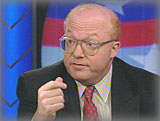 RICHARD
NORTON SMITH: Well, a convention is about two things. It is about a
party and it's about a nominee. And you'll remember Bill Clinton's bridge
into the 21st century. Two weeks ago the Republicans crossed it. And
there were times this week, particularly Tuesday night, when it felt
as if the Democrats were trying to get back to the other side, back
to the glory days of the New Deal and the '60s. It is also interesting,
what Paul said earlier, about this Populist tag; there were times tonight
when it sounded as if Al Gore was the outsider running against an incumbent.
It was almost like an Adlai Stevenson in 1956 trying to make the case
against Ike and prosperity or Walter Mondale running against Ronald
Reagan in 1984 -- an uphill fight. It is an interesting tact. The crowd,
I think the crowd loved it. It remains to be seen whether those outside
the hall will respond this same way. RICHARD
NORTON SMITH: Well, a convention is about two things. It is about a
party and it's about a nominee. And you'll remember Bill Clinton's bridge
into the 21st century. Two weeks ago the Republicans crossed it. And
there were times this week, particularly Tuesday night, when it felt
as if the Democrats were trying to get back to the other side, back
to the glory days of the New Deal and the '60s. It is also interesting,
what Paul said earlier, about this Populist tag; there were times tonight
when it sounded as if Al Gore was the outsider running against an incumbent.
It was almost like an Adlai Stevenson in 1956 trying to make the case
against Ike and prosperity or Walter Mondale running against Ronald
Reagan in 1984 -- an uphill fight. It is an interesting tact. The crowd,
I think the crowd loved it. It remains to be seen whether those outside
the hall will respond this same way.
JIM LEHRER: Doris.
|
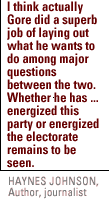 |
|
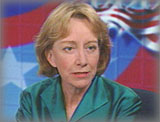 DORIS
KEARNS GOODWIN: Well, it seemed to me that, as a show, there is no question
that the Republican Convention provided one simple story line, which
does make it more coherent. They wanted to present themselves as the
party of the compassionate conservatives. And everything led up to that
final moment when George Bush spoke from Colin Powell that first night,
talking about affirmative action, from McCain coming in as a more independent
-- and then from the case being made to some extent against the Clinton
administration by Cheney leaving Bush free to appear as this compassionate
conservative. What you had here were a lot of different chapters and
a lot of different dramas going on at the same time, as we've said.
I think looking back in retrospect on Clinton's speech now, it was more
effective than I thought at the time because by laying the accomplishments
out in such great detail and with such zest, it gave Gore tonight the
freedom to look forward. And I think the big contrast that was made
implicitly, the question is whether it was too subtle or not, I don't
know -- is that this Gore is promising to be much more positive about
what he's going to do -- large things. These things add up to a lot
of large things with this surplus that we have -- as compared to the
Republican Party. And I think he also made a subtle contrast when he
used to word honor. Remember, in the Republican Convention that was
the huge theme. We will honor the presidency. He was used honor in a
very different way. We will honor is also an obligation. We will honor
working people by minimum wages; we will honor women by the right to
choose. So I think the comparison was really there. The question is,
it was sophisticated, was it too subtle to really hit people over the
head. I don't think so I think they are going to get it because there
is a vitality and a presentation tonight that I think really had an
emotional depth to it. DORIS
KEARNS GOODWIN: Well, it seemed to me that, as a show, there is no question
that the Republican Convention provided one simple story line, which
does make it more coherent. They wanted to present themselves as the
party of the compassionate conservatives. And everything led up to that
final moment when George Bush spoke from Colin Powell that first night,
talking about affirmative action, from McCain coming in as a more independent
-- and then from the case being made to some extent against the Clinton
administration by Cheney leaving Bush free to appear as this compassionate
conservative. What you had here were a lot of different chapters and
a lot of different dramas going on at the same time, as we've said.
I think looking back in retrospect on Clinton's speech now, it was more
effective than I thought at the time because by laying the accomplishments
out in such great detail and with such zest, it gave Gore tonight the
freedom to look forward. And I think the big contrast that was made
implicitly, the question is whether it was too subtle or not, I don't
know -- is that this Gore is promising to be much more positive about
what he's going to do -- large things. These things add up to a lot
of large things with this surplus that we have -- as compared to the
Republican Party. And I think he also made a subtle contrast when he
used to word honor. Remember, in the Republican Convention that was
the huge theme. We will honor the presidency. He was used honor in a
very different way. We will honor is also an obligation. We will honor
working people by minimum wages; we will honor women by the right to
choose. So I think the comparison was really there. The question is,
it was sophisticated, was it too subtle to really hit people over the
head. I don't think so I think they are going to get it because there
is a vitality and a presentation tonight that I think really had an
emotional depth to it.
JIM LEHRER: Michael?
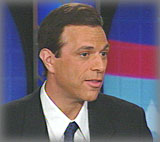 MICHAEL
BESCHLOSS: Well, Jim, we've just seen two narratives during the last
couple of weeks. In Philadelphia, you saw a party essentially saying
we've come through eight years of an economy that was great. And that
was thanks to the American people, not Bill Clinton. What's more, perhaps
the most important thing about it, they said was that it was presided
over by a president of low character, who also did not see the need
to squeeze higher meaning out of this economy. We, the Republicans,
can do that. What's more, we're centrist -- on the Democratic side,
it is almost like a Frank Capra film - what we saw tonight. It was almost
as if Al Gore said "don't you realize what you are about to see,
these Republicans are just about to pull the wool over your eyes, and
in fact these are the special interests and moneybags and the moguls
- they're about to run away with your country. I'm going to defend you
against that." It is absolutely fascinating -- two different views.
The other thing that I think is important to mention about this week
is, the importance of Joe Lieberman's personal story. In a way, it has
relieved Al Gore of the need to sort of milk his own life experience
for melodrama and emotion because, he's got someone on that ticket whose
personal story is so full of that, that in a way, it allows Al Gore
much more to tend to policy. But the final thing that I would say is
that election day is 80 days ahead, more or less. And I think if Al
Gore wins, I think we'll all be saying a year from now, that began tonight. MICHAEL
BESCHLOSS: Well, Jim, we've just seen two narratives during the last
couple of weeks. In Philadelphia, you saw a party essentially saying
we've come through eight years of an economy that was great. And that
was thanks to the American people, not Bill Clinton. What's more, perhaps
the most important thing about it, they said was that it was presided
over by a president of low character, who also did not see the need
to squeeze higher meaning out of this economy. We, the Republicans,
can do that. What's more, we're centrist -- on the Democratic side,
it is almost like a Frank Capra film - what we saw tonight. It was almost
as if Al Gore said "don't you realize what you are about to see,
these Republicans are just about to pull the wool over your eyes, and
in fact these are the special interests and moneybags and the moguls
- they're about to run away with your country. I'm going to defend you
against that." It is absolutely fascinating -- two different views.
The other thing that I think is important to mention about this week
is, the importance of Joe Lieberman's personal story. In a way, it has
relieved Al Gore of the need to sort of milk his own life experience
for melodrama and emotion because, he's got someone on that ticket whose
personal story is so full of that, that in a way, it allows Al Gore
much more to tend to policy. But the final thing that I would say is
that election day is 80 days ahead, more or less. And I think if Al
Gore wins, I think we'll all be saying a year from now, that began tonight.
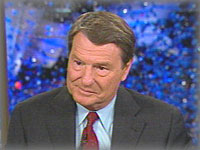 JIM
LEHRER: All right. Well, I've taken notes on everything that each of
you have said. And I want to take this opportunity to thank each of
you for your sterling service and wisdom here and also earlier at the
Republican Convention in Philadelphia as well. Mark Shields and Paul
Gigot, Doris Kearns Goodwin and Michael Beschloss, Haynes Johnson, and
to you, Richard Norton Smith, for your work here with us this week. JIM
LEHRER: All right. Well, I've taken notes on everything that each of
you have said. And I want to take this opportunity to thank each of
you for your sterling service and wisdom here and also earlier at the
Republican Convention in Philadelphia as well. Mark Shields and Paul
Gigot, Doris Kearns Goodwin and Michael Beschloss, Haynes Johnson, and
to you, Richard Norton Smith, for your work here with us this week.
And that does end our coverage of the year 2000, Democratic National
Convention here at the Staples Center in Los Angeles. We will be back
tomorrow night and next week at our regular time on the NewsHour and
on the Online NewsHour. But for now from Los Angeles, I'm Jim Lehrer.
Thank you and good night.
|
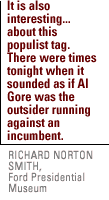 |



 HAYNES
JOHNSON: They were totally, completely different obviously from the
very beginning. In Philadelphia, you had this absolutely tight control.
George Bush himself said he had an iron fist and they got exactly what
they wanted out of that convention, total unity. They showed a new face
of the Republican Party. How real or unreal, it doesn't really matter.
They came out of that with their Republican base absolutely committed,
and there was a hunger to win there, and, Jim, I don't remember ever
being at a convention where I was, where the people who were there were
so convinced they were going to win -- that is, the Republicans. This
convention was quite different. It was very democratic. It wasn't on
time. It was dragging all over the place. Everybody was out there --
stiff and stumbling here and there, good and bad -- themes that didn't
particularly work at times. But it was all there. And you could see
it all there. And the case was being made, day by day, piece by piece
as you went on. The raising up to the moment that we've just passed
through, I think actually Gore did a superb job of laying out what he
wants to do among major questions between the two. Whether he has done
what Mark says -- energized this party or energized the electorate remains
to be seen. And that's going to depend on how he campaigns. They did
not take on George Bush in this convention. And that is what they have
to do now in the fall to say look, we really have different things to
offer.
HAYNES
JOHNSON: They were totally, completely different obviously from the
very beginning. In Philadelphia, you had this absolutely tight control.
George Bush himself said he had an iron fist and they got exactly what
they wanted out of that convention, total unity. They showed a new face
of the Republican Party. How real or unreal, it doesn't really matter.
They came out of that with their Republican base absolutely committed,
and there was a hunger to win there, and, Jim, I don't remember ever
being at a convention where I was, where the people who were there were
so convinced they were going to win -- that is, the Republicans. This
convention was quite different. It was very democratic. It wasn't on
time. It was dragging all over the place. Everybody was out there --
stiff and stumbling here and there, good and bad -- themes that didn't
particularly work at times. But it was all there. And you could see
it all there. And the case was being made, day by day, piece by piece
as you went on. The raising up to the moment that we've just passed
through, I think actually Gore did a superb job of laying out what he
wants to do among major questions between the two. Whether he has done
what Mark says -- energized this party or energized the electorate remains
to be seen. And that's going to depend on how he campaigns. They did
not take on George Bush in this convention. And that is what they have
to do now in the fall to say look, we really have different things to
offer.  RICHARD
NORTON SMITH: Well, a convention is about two things. It is about a
party and it's about a nominee. And you'll remember Bill Clinton's bridge
into the 21st century. Two weeks ago the Republicans crossed it. And
there were times this week, particularly Tuesday night, when it felt
as if the Democrats were trying to get back to the other side, back
to the glory days of the New Deal and the '60s. It is also interesting,
what Paul said earlier, about this Populist tag; there were times tonight
when it sounded as if Al Gore was the outsider running against an incumbent.
It was almost like an Adlai Stevenson in 1956 trying to make the case
against Ike and prosperity or Walter Mondale running against Ronald
Reagan in 1984 -- an uphill fight. It is an interesting tact. The crowd,
I think the crowd loved it. It remains to be seen whether those outside
the hall will respond this same way.
RICHARD
NORTON SMITH: Well, a convention is about two things. It is about a
party and it's about a nominee. And you'll remember Bill Clinton's bridge
into the 21st century. Two weeks ago the Republicans crossed it. And
there were times this week, particularly Tuesday night, when it felt
as if the Democrats were trying to get back to the other side, back
to the glory days of the New Deal and the '60s. It is also interesting,
what Paul said earlier, about this Populist tag; there were times tonight
when it sounded as if Al Gore was the outsider running against an incumbent.
It was almost like an Adlai Stevenson in 1956 trying to make the case
against Ike and prosperity or Walter Mondale running against Ronald
Reagan in 1984 -- an uphill fight. It is an interesting tact. The crowd,
I think the crowd loved it. It remains to be seen whether those outside
the hall will respond this same way.  DORIS
KEARNS GOODWIN: Well, it seemed to me that, as a show, there is no question
that the Republican Convention provided one simple story line, which
does make it more coherent. They wanted to present themselves as the
party of the compassionate conservatives. And everything led up to that
final moment when George Bush spoke from Colin Powell that first night,
talking about affirmative action, from McCain coming in as a more independent
-- and then from the case being made to some extent against the Clinton
administration by Cheney leaving Bush free to appear as this compassionate
conservative. What you had here were a lot of different chapters and
a lot of different dramas going on at the same time, as we've said.
I think looking back in retrospect on Clinton's speech now, it was more
effective than I thought at the time because by laying the accomplishments
out in such great detail and with such zest, it gave Gore tonight the
freedom to look forward. And I think the big contrast that was made
implicitly, the question is whether it was too subtle or not, I don't
know -- is that this Gore is promising to be much more positive about
what he's going to do -- large things. These things add up to a lot
of large things with this surplus that we have -- as compared to the
Republican Party. And I think he also made a subtle contrast when he
used to word honor. Remember, in the Republican Convention that was
the huge theme. We will honor the presidency. He was used honor in a
very different way. We will honor is also an obligation. We will honor
working people by minimum wages; we will honor women by the right to
choose. So I think the comparison was really there. The question is,
it was sophisticated, was it too subtle to really hit people over the
head. I don't think so I think they are going to get it because there
is a vitality and a presentation tonight that I think really had an
emotional depth to it.
DORIS
KEARNS GOODWIN: Well, it seemed to me that, as a show, there is no question
that the Republican Convention provided one simple story line, which
does make it more coherent. They wanted to present themselves as the
party of the compassionate conservatives. And everything led up to that
final moment when George Bush spoke from Colin Powell that first night,
talking about affirmative action, from McCain coming in as a more independent
-- and then from the case being made to some extent against the Clinton
administration by Cheney leaving Bush free to appear as this compassionate
conservative. What you had here were a lot of different chapters and
a lot of different dramas going on at the same time, as we've said.
I think looking back in retrospect on Clinton's speech now, it was more
effective than I thought at the time because by laying the accomplishments
out in such great detail and with such zest, it gave Gore tonight the
freedom to look forward. And I think the big contrast that was made
implicitly, the question is whether it was too subtle or not, I don't
know -- is that this Gore is promising to be much more positive about
what he's going to do -- large things. These things add up to a lot
of large things with this surplus that we have -- as compared to the
Republican Party. And I think he also made a subtle contrast when he
used to word honor. Remember, in the Republican Convention that was
the huge theme. We will honor the presidency. He was used honor in a
very different way. We will honor is also an obligation. We will honor
working people by minimum wages; we will honor women by the right to
choose. So I think the comparison was really there. The question is,
it was sophisticated, was it too subtle to really hit people over the
head. I don't think so I think they are going to get it because there
is a vitality and a presentation tonight that I think really had an
emotional depth to it.  MICHAEL
BESCHLOSS: Well, Jim, we've just seen two narratives during the last
couple of weeks. In Philadelphia, you saw a party essentially saying
we've come through eight years of an economy that was great. And that
was thanks to the American people, not Bill Clinton. What's more, perhaps
the most important thing about it, they said was that it was presided
over by a president of low character, who also did not see the need
to squeeze higher meaning out of this economy. We, the Republicans,
can do that. What's more, we're centrist -- on the Democratic side,
it is almost like a Frank Capra film - what we saw tonight. It was almost
as if Al Gore said "don't you realize what you are about to see,
these Republicans are just about to pull the wool over your eyes, and
in fact these are the special interests and moneybags and the moguls
- they're about to run away with your country. I'm going to defend you
against that." It is absolutely fascinating -- two different views.
The other thing that I think is important to mention about this week
is, the importance of Joe Lieberman's personal story. In a way, it has
relieved Al Gore of the need to sort of milk his own life experience
for melodrama and emotion because, he's got someone on that ticket whose
personal story is so full of that, that in a way, it allows Al Gore
much more to tend to policy. But the final thing that I would say is
that election day is 80 days ahead, more or less. And I think if Al
Gore wins, I think we'll all be saying a year from now, that began tonight.
MICHAEL
BESCHLOSS: Well, Jim, we've just seen two narratives during the last
couple of weeks. In Philadelphia, you saw a party essentially saying
we've come through eight years of an economy that was great. And that
was thanks to the American people, not Bill Clinton. What's more, perhaps
the most important thing about it, they said was that it was presided
over by a president of low character, who also did not see the need
to squeeze higher meaning out of this economy. We, the Republicans,
can do that. What's more, we're centrist -- on the Democratic side,
it is almost like a Frank Capra film - what we saw tonight. It was almost
as if Al Gore said "don't you realize what you are about to see,
these Republicans are just about to pull the wool over your eyes, and
in fact these are the special interests and moneybags and the moguls
- they're about to run away with your country. I'm going to defend you
against that." It is absolutely fascinating -- two different views.
The other thing that I think is important to mention about this week
is, the importance of Joe Lieberman's personal story. In a way, it has
relieved Al Gore of the need to sort of milk his own life experience
for melodrama and emotion because, he's got someone on that ticket whose
personal story is so full of that, that in a way, it allows Al Gore
much more to tend to policy. But the final thing that I would say is
that election day is 80 days ahead, more or less. And I think if Al
Gore wins, I think we'll all be saying a year from now, that began tonight.
 JIM
LEHRER: All right. Well, I've taken notes on everything that each of
you have said. And I want to take this opportunity to thank each of
you for your sterling service and wisdom here and also earlier at the
Republican Convention in Philadelphia as well. Mark Shields and Paul
Gigot, Doris Kearns Goodwin and Michael Beschloss, Haynes Johnson, and
to you, Richard Norton Smith, for your work here with us this week.
JIM
LEHRER: All right. Well, I've taken notes on everything that each of
you have said. And I want to take this opportunity to thank each of
you for your sterling service and wisdom here and also earlier at the
Republican Convention in Philadelphia as well. Mark Shields and Paul
Gigot, Doris Kearns Goodwin and Michael Beschloss, Haynes Johnson, and
to you, Richard Norton Smith, for your work here with us this week.